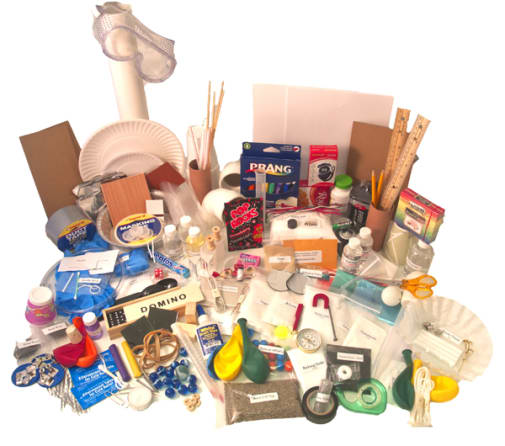The Elementary Chemistry & Physics by Apologia uses very specific items in their labs; this kit is a great convenience to complete those labs. Bagged and labeled by lesson, the kit includes: 25ml plastic cylinder, table salt, plastic straw, turkey baster, die, bead, ping pong ball, small block of wood, cork, aluminum foil, Neodymium magnet, effervescent tablet, popcorn kernel, rubbing alcohol, flavored gelatin, wax paper, needle, pint and gallon size bags, gum, balloon, Epsom salt, Pop Rocks Candy, small paper plates, paper plate, Nerds candy, yeast, gloves, Peanut M&Ms, peroxide, borax, cornstarch, spoon, rubber band, string, bamboo skewers, Styrofoam cups, red & blue litmus paper, Mentos, steel wool, cardboard tube, thread, sugar, candle wick, thermometers, vinegar, alum, potassium nitrate, cotton swab, coffee filter, white sand, sand, dish soap, chalk, stopwatch, marbles, index card, pie pan, modeling clay, toothpick, washer, baking soda, funnel, black powder paint, Cheerios, dominoes, mirrors, prisms, bouncing ball, adhesive putty, colored cellophane pack, PVC elbows and pipe, small nail, film canister, rubbing alcohol, cooking oil, small paper cups, sandpaper, cardboard, electrical tape, 6-volt battery, insulated copper wire, small light bulbs, light bulb holders, large paper clips, paper fasteners, d-cell battery, Wint-O-Green Lifesaver, pepper packet, LED bulb, needle, bar magnet, horseshoe magnet, iron filings, compass, AA battery, lid for water bottle, bare copper wire, round magnets, 3" iron nail, paper clips pack, small board, rope, and plastic tubing. Some items used in the labs are too large to be bagged with the lesson and are found loose in the kit. Those items are marked with an asterisk on the packing list that is included. You will still need to gather some items from around your home, but this kit really takes a lot of the effort out of it. ~ Donna
Exploring Creation with Chemistry & Physics Lab Kit for Apologia
- Small parts. Not for children under 3 years.
Description
A lab kit designed for the Apologia Young Explorer Series - Exploring Creation with Chemistry & Physics. Although many of the items may be easy to find at home or stores close by, this kit makes it a lot easier to do the experiments by having the items gathered together, all in one box ready to use. A complete list of what is provided in the kit, and a list of extra items needed to do the experiment, is included in the kit.
NOTICE FOR CALIFORNIA RESIDENTS: WARNING: Cancer and Reproductive Harm – www.P65Warnings.ca.gov
If a tree falls in the forest and no one is present to hear it, does it still make a sound? Exploring this question and countless others is at the heart of this newest course in the Apologia Elementary series. Offering fourteen lessons to be completed at your child's individual pacing, topics covered include a general introduction to chemistry and matter from a Biblical perspective, types of matter, the building blocks of creation, compound chemistry, mixtures, Newton's laws, gravity, forms of energy (including renewable energy), sound, light and spectrum of colors, thermodynamics, electricity, magnetism, simple machines and much more. Hands-on activities abound! Children will make smoke bombs, lava lamps and even create a periodic table from sugar cookies (YUM!). Notebook activities are plentiful in the text book, although an optional notebook is also available to enhance the learning experience. Author Jeannie Fulbright has once again given homeschool families a powerful tool for teaching science to our children. A complete supply list is found at the back of the book, although prepackaged science kits are available for your convenience.
Available for younger students or reluctant writers, the Junior Notebooking Journal requires less handwriting and provides more coloring pages than the original Notebooking Journal. Additional supplements include an audiobook MP3 CD and a Lab Kit packaged by Nature’s Workshop. Most activities require only household items and common supplies. You can gather these for each activity as you go, or purchase the kit for convenience. ~Deanne
| Product Format: | Other |
|---|---|
| Grades: | K-6 |
| Brand: | Nature's Workshop |
| Length in Inches: | 18 |
| Width in Inches: | 12 |
| Height in Inches: | 9 |
| Weight in Pounds: | 15.6 |

